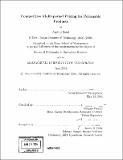Competitive multi-period pricing for perishable products
Author(s)
Sood, Anshul, 1978-
DownloadFull printable version (4.940Mb)
Other Contributors
Massachusetts Institute of Technology. Operations Research Center.
Advisor
Georgia Perakis.
Terms of use
Metadata
Show full item recordAbstract
Pricing of a perishable product over a multi-period time horizon is a challenging problem under an oligopolistic market framework. We propose and study a model for multi-period pricing in an oligopolistic market for a single perishable product. Each participating seller in the market has a fixed inventory of the product at the beginning of the time horizon and additional production is not an available option. Any unsold inventory at the end of the horizon is worthless. The sellers do not have the option of periodically reviewing and replenishing their inventory. Such a model is appropriate for modelling competition in situations where inventory replenishment decisions are made over a longer time horizon and can be considered exogenous to the pricing decision process. This kind of a setup can be used to model pricing of air fares, hotel reservations, bandwidth in communication networks, etc. In this thesis, we study two issues related to multi-period pricing of a perishable product. First we study the competitive aspect of the problem. Second we study the setup where the demand function for each seller has some associated uncertainty. We assume that the sellers would like to adopt a policy that is robust to adverse uncertain circumstances. We discuss the challenges associated with the analysis for this model. (cont.) We study non-cooperative Nash equilibrium policies for the sellers. We discuss why known results from the literature do not extend to this model. We introduce an optimization approach using results from variational inequality theory and robust optimization to establish existence of the pricing equilibrium policy and comment on the uniqueness of the pricing equilibrium policy. We also introduce an iterative learning algorithm for computing the equilibrium policy and analyze its convergence. We study how much is lost in terms of efficiency (in terms of total system profit) due to competition. Finally, we illustrate our results with some numerical examples and discuss some insights.
Description
Thesis (Ph. D.)--Massachusetts Institute of Technology, Sloan School of Management, Operations Research Center, 2004. Includes bibliographical references (p. 161-165).
Date issued
2004Department
Massachusetts Institute of Technology. Operations Research Center; Sloan School of ManagementPublisher
Massachusetts Institute of Technology
Keywords
Operations Research Center.